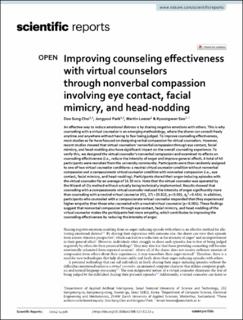Please use this identifier to cite or link to this item:
https://doi.org/10.21256/zhaw-30697Full metadata record
| DC Field | Value | Language |
|---|---|---|
| dc.contributor.author | Choi, Doo Sung | - |
| dc.contributor.author | Park, Jongyoul | - |
| dc.contributor.author | Loeser, Martin | - |
| dc.contributor.author | Seo, Kyoungwon | - |
| dc.date.accessioned | 2024-05-22T12:26:33Z | - |
| dc.date.available | 2024-05-22T12:26:33Z | - |
| dc.date.issued | 2024-01-04 | - |
| dc.identifier.issn | 2045-2322 | de_CH |
| dc.identifier.uri | https://digitalcollection.zhaw.ch/handle/11475/30697 | - |
| dc.description.abstract | An effective way to reduce emotional distress is by sharing negative emotions with others. This is why counseling with a virtual counselor is an emerging methodology, where the sharer can consult freely anytime and anywhere without having to fear being judged. To improve counseling effectiveness, most studies so far have focused on designing verbal compassion for virtual counselors. However, recent studies showed that virtual counselors' nonverbal compassion through eye contact, facial mimicry, and head-nodding also have significant impact on the overall counseling experience. To verify this, we designed the virtual counselor's nonverbal compassion and examined its effects on counseling effectiveness (i.e., reduce the intensity of anger and improve general affect). A total of 40 participants were recruited from the university community. Participants were then randomly assigned to one of two virtual counselor conditions: a neutral virtual counselor condition without nonverbal compassion and a compassionate virtual counselor condition with nonverbal compassion (i.e., eye contact, facial mimicry, and head-nodding). Participants shared their anger-inducing episodes with the virtual counselor for an average of 16.30 min. Note that the virtual counselor was operated by the Wizard-of-Oz method without actually being technically implemented. Results showed that counseling with a compassionate virtual counselor reduced the intensity of anger significantly more than counseling with a neutral virtual counselor (F(1, 37) = 30.822, p < 0.001, ηp2 = 0.454). In addition, participants who counseled with a compassionate virtual counselor responded that they experienced higher empathy than those who counseled with a neutral virtual counselor (p < 0.001). These findings suggest that nonverbal compassion through eye contact, facial mimicry, and head-nodding of the virtual counselor makes the participants feel more empathy, which contributes to improving the counseling effectiveness by reducing the intensity of anger. | de_CH |
| dc.language.iso | en | de_CH |
| dc.publisher | Nature Publishing Group | de_CH |
| dc.relation.ispartof | Scientific Reports | de_CH |
| dc.rights | https://creativecommons.org/licenses/by/4.0/ | de_CH |
| dc.subject | Counseling | de_CH |
| dc.subject | Machine learning (ML) | de_CH |
| dc.subject | Nonverbal communication | de_CH |
| dc.subject | Artificial intelligence (AI) | de_CH |
| dc.subject.ddc | 006: Spezielle Computerverfahren | de_CH |
| dc.subject.ddc | 150: Psychologie | de_CH |
| dc.subject.ddc | 302.2: Kommunikation | de_CH |
| dc.title | Improving counseling effectiveness with virtual counselors through nonverbal compassion involving eye contact, facial mimicry, and head-nodding | de_CH |
| dc.type | Beitrag in wissenschaftlicher Zeitschrift | de_CH |
| dcterms.type | Text | de_CH |
| zhaw.departement | School of Engineering | de_CH |
| dc.identifier.doi | 10.1038/s41598-023-51115-y | de_CH |
| dc.identifier.doi | 10.21256/zhaw-30697 | - |
| dc.identifier.pmid | 38177239 | de_CH |
| zhaw.funding.eu | No | de_CH |
| zhaw.issue | 1 | de_CH |
| zhaw.originated.zhaw | Yes | de_CH |
| zhaw.pages.start | 506 | de_CH |
| zhaw.publication.status | publishedVersion | de_CH |
| zhaw.volume | 14 | de_CH |
| zhaw.publication.review | Peer review (Publikation) | de_CH |
| zhaw.author.additional | No | de_CH |
| zhaw.display.portrait | Yes | de_CH |
| Appears in collections: | Publikationen School of Engineering | |
Files in This Item:
| File | Description | Size | Format | |
|---|---|---|---|---|
| 2024_Choi-etal_Improving-virtual-counselors-through-nonverbal-compassion_SciRep.pdf | 1.52 MB | Adobe PDF |  View/Open |
Show simple item record
Choi, D. S., Park, J., Loeser, M., & Seo, K. (2024). Improving counseling effectiveness with virtual counselors through nonverbal compassion involving eye contact, facial mimicry, and head-nodding. Scientific Reports, 14(1), 506. https://doi.org/10.1038/s41598-023-51115-y
Choi, D.S. et al. (2024) ‘Improving counseling effectiveness with virtual counselors through nonverbal compassion involving eye contact, facial mimicry, and head-nodding’, Scientific Reports, 14(1), p. 506. Available at: https://doi.org/10.1038/s41598-023-51115-y.
D. S. Choi, J. Park, M. Loeser, and K. Seo, “Improving counseling effectiveness with virtual counselors through nonverbal compassion involving eye contact, facial mimicry, and head-nodding,” Scientific Reports, vol. 14, no. 1, p. 506, Jan. 2024, doi: 10.1038/s41598-023-51115-y.
CHOI, Doo Sung, Jongyoul PARK, Martin LOESER und Kyoungwon SEO, 2024. Improving counseling effectiveness with virtual counselors through nonverbal compassion involving eye contact, facial mimicry, and head-nodding. Scientific Reports. 4 Januar 2024. Bd. 14, Nr. 1, S. 506. DOI 10.1038/s41598-023-51115-y
Choi, Doo Sung, Jongyoul Park, Martin Loeser, and Kyoungwon Seo. 2024. “Improving Counseling Effectiveness with Virtual Counselors through Nonverbal Compassion Involving Eye Contact, Facial Mimicry, and Head-Nodding.” Scientific Reports 14 (1): 506. https://doi.org/10.1038/s41598-023-51115-y.
Choi, Doo Sung, et al. “Improving Counseling Effectiveness with Virtual Counselors through Nonverbal Compassion Involving Eye Contact, Facial Mimicry, and Head-Nodding.” Scientific Reports, vol. 14, no. 1, Jan. 2024, p. 506, https://doi.org/10.1038/s41598-023-51115-y.
Items in DSpace are protected by copyright, with all rights reserved, unless otherwise indicated.